
Outside Inside is the sixth studio album by The Tubes, released in 1983. It was the second album by the group to be released by Capitol Records. The album was produced by David Foster. The Tubes had their biggest radio hit with the single from this album, "She's a Beauty".

A Collection of Great Dance Songs is a compilation album by the English rock band Pink Floyd. It was released on 23 November 1981 in the United Kingdom by Harvest Records and in the United States by Columbia Records.
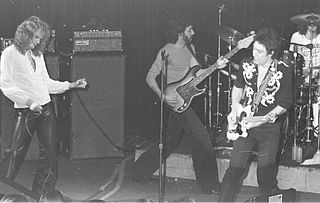
Prism is a Canadian rock band formed in Vancouver in 1977. They were originally active from 1977 to 1984 and have been active again from 1987 to present. Their classic line-up consisted of lead singer Ron Tabak, guitarist Lindsay Mitchell, keyboardist John Hall, bassist Allen Harlow and drummer Rocket Norton.

Chicago 16 is the thirteenth studio album by the American rock band Chicago, released on June 7, 1982. It is considered their "comeback" album because it was their first album to go platinum since 1978's Hot Streets. It made it into the Billboard 200 top ten, and produced their second number one single in the United States, "Hard to Say I'm Sorry". The album was certified gold by the Recording Industry Association of America (RIAA) in August, 1982, two months after its release, and platinum in December, 1982. "Hard to Say I'm Sorry" was nominated for a Grammy Award for Best Pop Performance by a Duo or Group with Vocal.
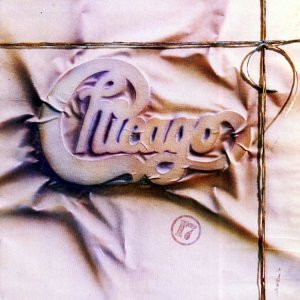
Chicago 17 is the fourteenth studio album by American rock band Chicago, released on May 14, 1984. It was the group's second release for Full Moon/Warner Bros. Records, their second album to be produced by David Foster and their last with founding bassist/vocalist Peter Cetera. As of 2023, it remains Chicago's best-selling album, with over 6.1 million units being sold in the United States, the United Kingdom, and Japan. Four singles were released from the album, all of which peaked in the top 20 on the Billboard Hot 100 chart. The success of the music videos for "Stay the Night", "You're the Inspiration", and "Hard Habit to Break" on MTV propelled Chicago 17 to achieve an RIAA certification of six times platinum.

Chicago 19 is the sixteenth studio album by American rock band Chicago, released on June 20, 1988. After recording Chicago 18 with David Foster, the band worked primarily with producers Ron Nevison and Chas Sandford for this album. Their Full Moon Records imprint moved to Reprise Records. This is the final album to feature the band's original drummer Danny Seraphine, who was dismissed from the group in 1990.

Native Tongue is the fourth studio album by American glam metal band Poison, released in 1993 through Capitol Records. It peaked at #16 on the Billboard 200, #20 on the UK Albums Chart and was certified gold by the RIAA on April 21, 1993. It has also been certified by CAN platinum. This is the only album to feature lead guitarist Richie Kotzen. Kotzen was hired as the band's guitarist following the firing of C.C. DeVille in late 1991. The album features the singles "Stand", "Until You Suffer Some " and "Body Talk".
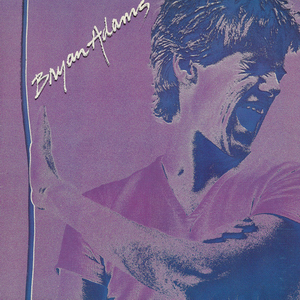
Bryan Adams is the debut solo studio album by Canadian singer-songwriter Bryan Adams, after previously being the lead vocalist of Canadian hard rock band Sweeney Todd, released on 12 February 1980 by A&M Records. "Hidin' From Love" reached number 64 and "Give Me Your Love" reached number 91 on Canada's RPM 100 Singles chart.

The Swing is the fourth studio album by Australian rock band INXS, released on 21 March 1984. It peaked at number one on the Kent Music Report Albums Chart for five non-consecutive weeks from early April to mid-May 1984. The lead single "Original Sin" was recorded in New York City with Nile Rodgers and featured Daryl Hall on backing vocals. Overall, the album featured a slightly harder-edged sound than their previous releases.

Victim of Love is the thirteenth studio album by English musician Elton John. It is a disco album, released in 1979 shortly after the peak of disco's popularity. It was not critically or commercially well-received, and is John's third lowest charting album to date in the US, after 1986's Leather Jackets and 1985's Ice on Fire.

21 at 33 is the fourteenth studio album by English musician Elton John, released in 1980. It was his 21st album in total, made when John was 33 years old, hence the title. Three singles were released from the album, including "Little Jeannie", his highest-charting U.S. single in 5 years. The album sold over 900,000 copies in the United States, missing a Platinum certification.

"I Can't Tell You Why" is a song by the American rock band Eagles that appeared on their 1979 album The Long Run. It was written by band members Timothy B. Schmit, Glenn Frey and Don Henley. Recorded in March 1978, it was the first song finished for the album and the first Eagles song to feature Schmit on lead vocals. Released as a single in February 1980, it became a Billboard top 10 hit in April, reaching number eight on the Billboard Hot 100 and number three on the Adult Contemporary chart. It was the group's last top ten hit on the Billboard Hot 100.
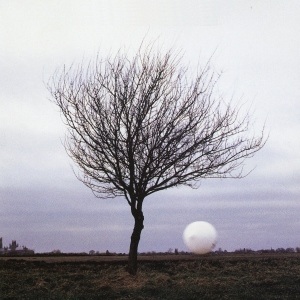
"Take It Back" is a song by the progressive rock band Pink Floyd, released as the seventh track on their 1994 album The Division Bell. It was also released as a single on 16 May 1994, the first from the album, and Pink Floyd's first for seven years. The single peaked at number 23 on the UK Singles Chart, the fourth highest in the band's history, below 1979 number 1 hit "Another Brick In The Wall" and 1967 top 20 hits "See Emily Play" and "Arnold Layne." The music for the song was written by guitarist David Gilmour and album co-producer Bob Ezrin, with lyrics by Gilmour, his wife Polly Samson and Nick Laird-Clowes.
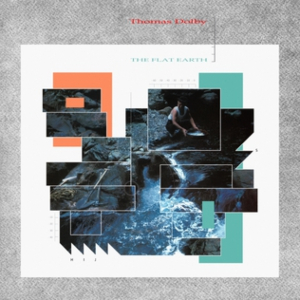
The Flat Earth is the second studio album by the English new wave and synth-pop musician Thomas Dolby, released on 10 February 1984 by EMI and Capitol Records.

Alibi is the ninth studio album by American folk rock duo America, released by Capitol Records in 1980.

Cocker is the tenth studio album by Joe Cocker, released in April 1986, his second on Capitol label. It features hit singles "You Can Leave Your Hat On" and "Don't You Love Me Anymore", the first made popular after its use in the famous striptease scene in the film 9½ Weeks. Released as a single, Cocker's version of the song peaked at No. 35 on Billboard Hot Mainstream Rock Tracks. The album also features rendition of Marvin Gaye's "Inner City Blues", a Motown legend's classic lament to urban decay.

"Love Will Keep Us Alive" is a song written by Jim Capaldi, Paul Carrack, and Peter Vale and produced by the Eagles, Elliot Scheiner, and Rob Jacobs. It was first performed by the Eagles in 1994, during their Hell Freezes Over reunion tour, with lead vocals by bassist Timothy B. Schmit. This is the last single to feature Don Felder, who was terminated from the band in 2001.

Small Change is the fifth studio album by Canadian rock band Prism, released in December 1981 by Capitol Records. It was the first of two Prism studio albums with lead vocalist Henry Small, who had replaced Ron Tabak after his forced departure and the last studio album to feature guitarist and founding member Lindsay Mitchell. The album is generally regarded as the genesis of the smoother, more adult-oriented sound of the band's later work. The album peaked at No. 53 on the Billboard 200.
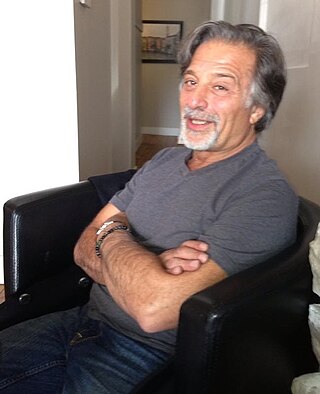
Henry Cave Small is an American-Canadian singer, songwriter, composer, multi-instrumentalist and radio personality. In a career spanning more than 50 years, Small has been a member of four rock bands: Prism, Scrubbaloe Caine, Small Wonder, and the Gainsborough Gallery.

Young and Restless is the fourth studio album by Canadian rock band Prism, released in May 1980 by Capitol Records. The album is notably the band's last studio album to feature lead vocalist Ron Tabak, and it is also the last album to feature their long-time producer, Bruce Fairbairn.




















